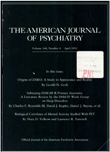Psychiatric aspects of organ transplantation [published erratum appears in Am J Psychiatry 1989 Nov;146(11):1523]
Abstract
Technical advances in surgery and the new antirejection agents cyclosporine and muromonab-CD3 have led to improved outcome for organ transplantation. Allograft rejection and complications of immunosuppressant therapy are often associated with considerable stress, so availability of psychiatric consultation is a necessity. As a transplant team consultant, the psychiatrist treats perioperative anxiety, depression, and organic brain dysfunction and addresses medical and ethical aspects of patient selection. Studies indicate that many patients with psychopathological conditions have good postoperative results and that most living kidney donors participate spontaneously and consider donation a positive experience.
Access content
To read the fulltext, please use one of the options below to sign in or purchase access.- Personal login
- Institutional Login
- Sign in via OpenAthens
- Register for access
-
Please login/register if you wish to pair your device and check access availability.
Not a subscriber?
PsychiatryOnline subscription options offer access to the DSM-5 library, books, journals, CME, and patient resources. This all-in-one virtual library provides psychiatrists and mental health professionals with key resources for diagnosis, treatment, research, and professional development.
Need more help? PsychiatryOnline Customer Service may be reached by emailing [email protected] or by calling 800-368-5777 (in the U.S.) or 703-907-7322 (outside the U.S.).



